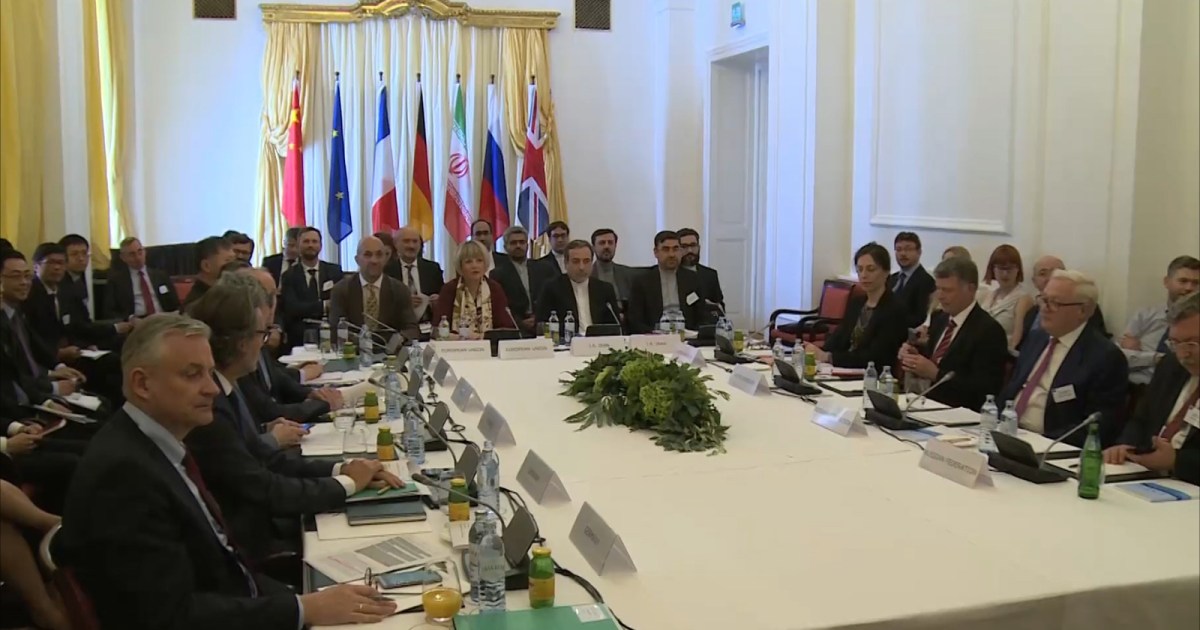The Iranian Foreign Ministry accused Washington of putting obstacles in the way of the Vienna negotiations to revive the nuclear agreement. On the other hand, the US State Department warned Tehran of paying the price if it proceeded to accelerate its nuclear program, while Israel urged Western countries to change their strategy in dealing with Iran.
An official in the Iranian Foreign Ministry said that reviving the nuclear agreement signed in 2015 depends on the Europeans showing will and flexibility, stressing that Washington's unwillingness to back down from lifting all sanctions on Tehran is a major obstacle to negotiations.
The Iranian official accused Israel of trying to disrupt the talks, by launching what he described as psychological warfare and by spreading false news, in order to negatively affect the atmosphere of negotiations.
In turn, Gholamhossein Esmaili, director of the Iranian president's office, stressed that his country is completely serious about the Vienna negotiations, and that its ultimate goal in the negotiations is to abolish sanctions while preserving the country's dignity.
Today, Sunday, IRNA quoted Esmaili as saying that "we are completely serious about the Vienna negotiations, and our ultimate goal in the negotiations with the 4+1 group is the abolition of sanctions... We were ready to continue negotiations, but the other parties saw that they needed to turn." to their capitals to discuss the issues presented.
Indirect talks between the United States and Iran to revive the Iranian nuclear deal stopped the day before yesterday, Friday, and will continue next week, and European officials expressed their dismay at the number of demands made by the Iranian government.
A new round of negotiations is scheduled to begin next week.
Negotiations are taking place between Iran and the 4+1 group (Germany, France, Britain, Russia and China), along with the representative of the European Union.
The United States is participating indirectly in the negotiations, with the aim of reviving the Iranian nuclear agreement, after it was disrupted by the United States' withdrawal from it during the era of former President Donald Trump.
American threats
On the other hand, a US State Department official said that a return to the nuclear agreement is possible, but it requires concessions from Iran and the United States together.
The official told reporters, asking not to be named, that Iran continues to accelerate its nuclear program in provocative ways, noting that China and Russia were surprised by the extent of Iran's regression in the proposals presented at last week's talks in Vienna.
He added that Iran came with proposals that "represented a retreat from anything, from any compromises that Iran offered here in the previous six rounds of talks, and confiscated all the compromises made by others, and the United States in particular."
The US official told reporters that he did not know when the next round of talks, which other officials said would resume next week, would resume.
The official stressed that the date is less important than that Iran is ready for serious negotiations.
According to the US official, the continuation of the sanctions comes within the continuous pressure on Iran to push it back to the nuclear agreement.
He warned against resorting to non-diplomatic means, if Iran did not show any goodwill to return to the agreement;
He stressed that there is a price that Iran will pay if it continues to violate the agreement and accelerate its nuclear program.
Earlier on Saturday, European countries rejected Iran's proposals to return to the nuclear agreement and considered them disappointing, at a time when Tehran stressed that these proposals are based on common principles between the two sides.
On Friday, the Europeans expressed their "disappointment and concern" over the content of two recent drafts submitted by Iran regarding the revival of the nuclear agreement signed by Iran and international parties in 2015, and the United States withdrew from it in 2018.
Israeli incitement
In a related context, Israeli Prime Minister Naftali Bennett stressed the need for "Iran to pay the price for violating the nuclear agreement."
Bennett called - during a speech at the beginning of the Israeli government meetings today, Sunday - the countries negotiating with Iran in Vienna to take a firm approach against it.
He urged what he described as Israel's friends in the United States to use different options to confront the Iranian rush in the field of enrichment.
רה"מ בנט: "איראן חייבת להתחיל לשלם מחירים על ההפרות שלה" https://t.co/uB3D1pIjzy pic.twitter.com/KPWhnDEjwr
— MivzakLive News - חדשות מבזק לייב (@mivzaklive) December 5, 2021
The head of the Israeli Mossad, David Barnea, left yesterday evening, Saturday, for Washington, to hold talks focusing on the Iranian nuclear file.
He is scheduled to meet with US Secretary of State Anthony Blinken, Defense Secretary Lloyd Austin, and a number of senior officials.
According to the website of the Israeli newspaper, Yedioth Ahronoth, it is expected that Barnea will brief the American side on recent intelligence information collected by Israel.
A few days ago, the Mossad chief vowed that Iran would not have a nuclear weapon, neither in the immediate nor in the long term.
It is also scheduled that Israeli Defense Minister Benny Gantz will visit Washington soon, with the aim of coordinating with the American side on the Iranian file and others.
And the newspaper "Yediot Aharonot" reported that the US administration conveyed messages to senior security officials in Israel that it opposes the Mossad's surprise by carrying out secret operations in Iran during the nuclear negotiations.
Israel recently accused Iran of practicing what it called nuclear blackmail, and called on the United States to stop the Vienna negotiations.
This is in parallel with an Israeli warning of the possibility of a strike on Iran, and its approval to purchase weapons and ammunition worth about two billion dollars.
The Israeli government has allocated $1.5 billion to prepare the armed forces to carry out a possible strike against Iranian nuclear sites, and political and military leaders issue almost daily warnings.

